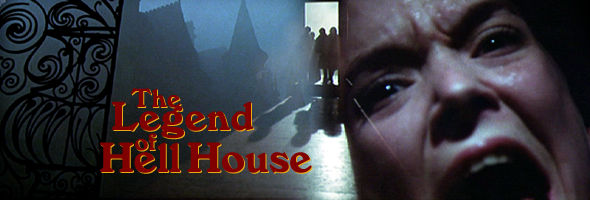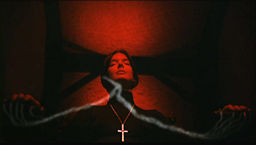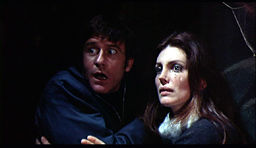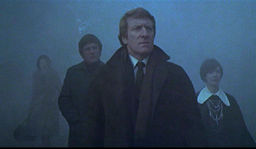
Color, 1970, 81 mins. / Directed by John Hough / Starring Pamela Franklin, Roddy McDowall, Clive Revill, Gayle Hunnicutt, Michael Gough / Music by Delia Derbyshire & Brian Hodgson / Written by Richard Matheson Format: DVD - Fox (MSRP $19.98) / Letterboxed (1.85:1) (16x9 enhanced) / Dolby Digital 4.0
Adapted by the legendary Richard Matheson from his novel Hell House, this unnerving combination of old-fashioned haunted house tricks with modern scientific jargon and (comparatively mild) sex and violence makes for a memorable, atmospheric experience. The set up will be nothing new to viewers
Four brave souls enter the foreboding, windowless Belasco house, nicknamed "Hell House," to conduct an experiment determining the existence of life after death. The lone survivor from the disastrous previous investigation, a physical medium named Ben Fisher (Roddy McDowall), reluctantly agrees to spend a few days in the house along with mental medium Florence Tanner (Pamela Franklin) and physicist Lionel Barrett (Clive Revill) and his wife, Ann (Gayle Hunnicutt). Their first two psychic sitting sessions prove to be hostile and violent, leading Lionel to suspect that Florence may be either causing the manisfestations or is being used by some force in the house - perhaps its debauched owner, Belasco, who vanished under mysterious circumstances years ago. Florence claims to receive nightly visits from Belasco's previously unknown son, who had died in the house, and the mystery gradually deepens as each day becomes more perilous to the investigator's lives.
While films like The Innocents (also with Franklin) contained a perverse subtext if one was looking for it, The Legend of Hell House was the first ghost film to inject overt sexuality as a necessary part of its storyline. Significantly, even after the film is over the audience is not certain that Ann's memorable "sleepwalking" episode and Florence's seduction were in fact caused by the supernatural. Furthermore, both men are depicted as stodgy and repressed, which could explain why both women respond in such a carnal fashion to the influence of ghosts. Apart from one misstep involving a cat attack (almost as goofy as the one in Dario Argento's Inferno), the manifestations are well handled and often frightening, such as the ectoplasm appearance. Though all four performances are excellent, Franklin and McDowall (who gets some of the choicest,
A continuous staple on VHS and two time laserdisc release from Fox, The Legend of Hell House has never looked better than this widescreen DVD release. The 1.85:1 matting looks a bit odd at first after years of open matte framing, but ultimately it's better judged and more suggestive of the oppressive nature of Hell House than the previous square appearance. The colors are also far more vivid and richly saturated than before, apart from a few exterior shots in the opening third that still look pretty awful thanks to the original film materials. Just check out the crimson art direction in Franklin's bedroom or the ethereal stained glass in the chapel for a demonstration of how poorly this film was served on television and video before now. The new 4.0 stereo mix is often subtle but does a nice job of spreading out that creepy, haunting electronic score (if indeed it can technically be termed a score), and the dinner attack offers some nice surround action. Don't expect an audio experience on the level of Poltergeist, but this gets the job done just fine. The original mono track is also included for comparison, along with a nicely done French dub track. The only extra is the original theatrical trailer, which effectively captures the dark, sinister nature of the film without spoiling too many surprises; alas, the same can't be said for the cover art, which follows the tradition of the VHS sleeves by blowing a key surprise late in the film.
 of The Haunting, but Matheson's story weaves in some unusual directions and certainly layers on the chills, culminating in a memorably odd finale.
of The Haunting, but Matheson's story weaves in some unusual directions and certainly layers on the chills, culminating in a memorably odd finale.

 most quotable dialogue) stand out with two of the best performances of their careers, delivering an avalanche of potentially difficult lingo with committed gusto.
most quotable dialogue) stand out with two of the best performances of their careers, delivering an avalanche of potentially difficult lingo with committed gusto.
